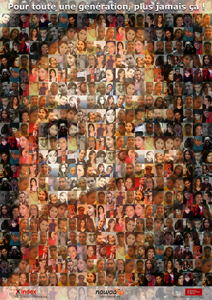This post is part of our special coverage Tunisia Revolution 2011.
The collective blog Nawaat, and IFEX-TMG (the Tunisia Monitoring Group of the International Freedom of Expression Exchange) have launched a campaign for freedom of speech in Tunisia, which remains under threat despite gains made during the last year.
Nawaat introduced [fr] the campaign:
À l’occasion de la Journée mondiale de la liberté de la presse et en soutien à la libre parole en Tunisie, une campagne publique en faveur de la liberté d’expression est lancée du 1er au 15 mai 2012. Cette campagne est menée par Nawaat et le Groupe d’observation de la Tunisie organisé par l’Échange international de la liberté d’expression (TMG de l’IFEX), une coalition de 21 membres de l’IFEX. Cette campagne est également soutenue par l’Union européenne et Oxfam Novib

"It was for an entire generation, but no more!", composed of avatars of Tunisian Twitter users. Image from Nawaat.org
Ads in Tunisian newspapers, billboard campaigns in the streets, and videos advocating freedom of expression are all part of this initiative. In addition, an anthology called Fleeting Words, bringing together articles, commentaries and poems written during and after the regime of Zine El Abidine Ben Ali has been published. The campaign also includes a series of trainings and workshops.
The campaign comes 18 months after the fall of the regime of Zine El Abidine Ben Ali, a long time enemy of freedom of speech. During these 18 months, gains for freedom of expression have been made. These gains include uncensored web access, the emergence of a culture of protest, an increase in the number of media outlets, and a flourishing of art, such as the art of caricature which has witnessed a boom since Ben Ali's departure.
The old practices, however, are far from over. In February, for instance, three journalists from the Arabic daily Attounisia were arrested for publishing a front page photo of Real Madrid midfielder Sami Khedira with his naked girlfriend. And on May 3 (World Press Freedom Day) a court in Tunis fined the owner of Nessma TV over the broadcast of the Iranian-French animated film Persepolis.
Index on Censorship, a member of IFEX-TMG, commented:
The need for continuing work in the sector was underlined by the prosecution of Nabil Karoui, director of privately-owned Nessma TV for blasphemy and disturbing public order.
This post is part of our special coverage Tunisia Revolution 2011.







1 comment